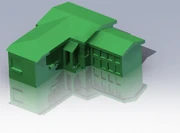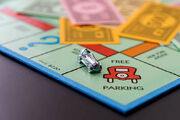
In the game of Monopoly, House Rules are variations on standard play. Some of them are very common, such as putting taxes and fines on Free Parking. Others, such as the "Sell Cards" rule are somewhat obscure. Many casual Monopoly players are surprised and disappointed to discover that some of the rules they are used to are not actually part of the official rules. House rules are totally forbidden in tournament play, as those games go by the Official Rules, plus time limits.
Common House Rules

- Free Parking cash: All taxes and fines from Chance and Community Chest cards, as well as taxes from Income Tax and Luxury Tax, and rent to other players, go to the center of the board. If someone lands on Free Parking, they immediately get all of the cash there. Other versions include placing the final unpurchased property there.
- Less Money: Each player gets just 1200 in 2 500s, 1 100, 1 50, 1 20, 2 10s, 1 5 and 5 1s
- Headstart: The Banker auctions any properties the players want (they usually pick Boardwalk). This is a very common house rule.
- More Money: Each players receive 2 500s, 2 100s, 10 50s, 10 20s, 7 10s, 5 5s, and 5 1s, instead of the original 2 500s, 2 100s, 2 50s, 6 20s, 5 10s, 5 5s, and 5 1s. In the mega edition, they get 2 500s, 2 100s, 10 50s, 10 20s, 7 10s, 5 5s, and 5 1s, but with the 1 1,000 bill.
- Even More Money: Each player uses 3 500s instead of 2 to make the game more fun.
- Stupid Bankruptcy: When a player lands on Free Parking, all other players pay the lucky player $10,000. Even if you add more bills in The Mega Edition, it's still very weird.

1000 bill used by some people in the original version.
- Exchange: If someone pays additional money (like $500 with the 500 bill for Boardwalk), the 100 monopoly bill goes to the center of the board, and when someone lands on Free Parking, the total exchanges go to the lucky player.

5000 bill used by some people in the mega version.
- Additional Bills: The banker uses 1000 bills (or 6 in the Junior Version and 5000 bills in the Mega Version) and they give more money to make entertainment longer and education shorter.
- Bankruptcy = No Longer Banker: If the Banker goes bankrupt, the player with the most cash becomes the Banker and the second most cash becomes the auctioneer.
- Double Go: A Player receives $400 for landing DIRECTLY ON Go.
- Card Sellers: A Chance or Community Chest card may be sold to another player for any price, but must NOT be revealed to ANY player until it is sold.
- Voluntary Bankruptcy: At any time, ONE player per game may declare Voluntary Bankruptcy. They return all they have to the Bank and receive $800 and the Purple/Brown properties. The owners of these properties will receive $120 in compensation, plus $50 per Houses and $250 per Hotel. This may only be done ONCE per game.
- Snake Eyes = Cash: When rolling 2 Ones (Snake Eyes), a player receives $100. Other versions call for one of each bill, totaling $666, plus the 20 bill.
- Take a Chance: A player has the option to do nothing when landing on a Chance space.
- Chance it, or Not: A variation on Take a Chance. Players are allowed to "take a chance" when they land on a Chance square. They have the option 1) to draw a chance card, or 2) to do nothing and sit freely on the square. No choice is given, however, when landing on a Community Chest square; the player must draw a card from the appropriate deck.
- No Auctions: Want to save time? Then, stop auctioning.
- Uneven Building: Players do not need to build evenly.
- Property Boom: Anxious to begin building? We hear you — with this rule, players do not have to own a complete set of properties before they start to build houses.
- Frozen Assets Rule: When in jail, a player cannot collect any rent money from other players.
- See the Sights: Players must travel around the board one complete time before they can begin buying properties. Hurry up and get to GO before everyone else!
- Cash Advance: Don’t have enough to buy Boardwalk? With this House Rule, players can make loans between each other to co-own properties. Who collects rent money? That’s determined by the new property owners!
- Three’s a Crowd: Are there 3 players in a row on 3 unique properties? Well done, each player gets an extra $500.
- Delayed Purchase: No players may purchase property until ONE player has passed Go. This rule makes the game go a little faster if the See the Sights rule is also used. This rule and the one above are good with games with 5 or more players.
- Go Go GO!: If a player lands directly on Go, he or she has the right to not collect their $200 and instead move their game piece to any place on the board.
- Speak up: The owner must demand rent before the very next player rolls, or even before the same player (having rolled doubles) rolls again. Further, some house rules may claim that if a player lands on somebody's property on a roll of doubles, he/she is not "staying the night" and therefore does not need to pay rent.
- Auction Winner: If the one who landed on the property does not win the auction, he pays the rent to the winner.
- Auction Loser: If the one who landed on the property does not win the auction, he is Quintuple Chairman Of The Board ($250 to each player)
- Gotta own them all: According to some home rules no property trading happens until all properties are owned by someone. At this point, play stops and a flurry of trading proceeds until all players are satisfied. Trades may be made regardless of a players turn in the game.
- Upgrade: Allow a player to build a hotel directly, even if there are not enough houses in the bank (one hotel equals five houses). This way a building shortage only affects poor players.
- Downgrade: Allow a player to downgrade a hotel to four house even though there are not enough houses (write-in paper that is 4 houses)
- Location, Location, Location: Build a certain property only when they land on it. Combined with the requirement that properties in a color group be developed equally, this makes development very slow as it can only be done one house at a time.
- Development Mogul: You are able to buy houses and hoard them in order to prevent others from winning.
- Half The Go: Players receive $100 for passing GO.
- Free Boardwalk: Want to own Boardwalk? Then, use this rule for buying Boardwalk for less than ten dollars.
- Regular Illinois Avenue: Buy Illinois Avenue from $24 to $2,400.
- Paid Mediterranean Avenue: Want to avoid Mediterranean Avenue? Then, use this rule for buying Mediterranean Avenue for over $1,000.
- Go for Win: When someone lands DIRECTLY in Go, he wins the game.
- Halfway Chairman of the Board: When you draw a Chance card making you Chairman of the Board, you pay each player $25.
- Jail Defender: When someone goes to jail, he/she must pay each player $100 (enough to save you from two jails)
- Blue and Green Free Block: Want to have two of the most valuable monopolies? Then, buy Boardwalk and Park Place for $4 and the three green properties for $3 and a Skyscraper in Boardwalk (Monopoly: The Mega Edition) could make every player pay you $3,000,000,000! That is impossible to make in the regular version. That is even more than fifteen thousand Boardwalk-sellers!
- Twelve-Cash: When someone rolls 12 (15 in mega edition), everyone pays him/her $35.
- Land Luck: When someone lands on Illinois Avenue (the most stopped space), he must pay everyone a tip of $24.
- Property with Tax: Add 10% Tax to any property you buy.
- Property with Tip: My Bank, do you want money? Then, for the brown properties, give a tip of $5. For the turquoise properties, give a tip of $10. For the pink properties, give a tip of $15. For the orange properties, give a tip of $20. For the red properties, give a tip of $35. For the yellow properties, give a tip of $50. For the green properties, give a tip of $75. For the blue properties, give a tip of $100. For the railroads, give a tip of $25. For the utilities, give a tip of $1.
- Tax and Tip Money: When two of the above house rules are used, the money goes to the center of the board and a lucky player gets it if they land on Free Parking.
- Boardwalk is no Bankrupt!: When someone buys Boardwalk, he must pay every player $100 ($200 in the Mega Edition)
- Go for Monopoly: When someone LANDS on GO, he gives other players hotel (in their monopoly) for free.
- Free Jail: When someone goes to Jail, in a 6-player game, every other player pays you $10.
- One-and-a-Half-Go: A player receiver $300 for landing directly on Go.
- Jail Auction: When you go to Jail, you must auction all of your properties.
- Free Additional Properties: In the Mega Edition, at the beginning of the game, the banker auctions Arctic Avenue, Massachusetts Avenue, Maryland Avenue, New Jersey Avenue, Gas Company, Michigan Avenue, California Avenue, South Carolina Avenue, and Florida Avenue.
- Jail Ends a Player: When someone goes to jail or lands in "Just Visiting", he goes bankrupt.
- Bankrupt Ends: When one player goes bankrupt, the game is over even in a 3-or-more-player-game. It is similar to Monopoly Junior.
- Sell Properties to the Bank: If mortgaging is not good for you, just sell them. This is similar to the No Auctions rule.
- $200 for GO during Jail: When a player passes GO, he collects $200, even in Jail.
- Free Jail: A player goes to Jail for one turn and gets it for free, but auctions his/her most expensive property.
- Decuple Go: A player receives $2,000 for passing GO.
- Tenth-Of-Go: A player receives $20 for passing GO.
- No Mortgages: Sell title deeds and get half the price to be an anti-auctioneer! This House Rule Will Save Your Time.
- Skyscrapers: Build yellow skyscrapers in the original version!
- Space Elevators: Build blue space elevators in the mega version!
- Cash for Winner: When you get $5,000, you win the game. But in the Mega Edition, if you get $10,000, you win the game.
- Free Parking Auction: When you land on Free Parking, pick a property for the bank to auction. This is similar to the Auction space in the Mega Edition.
- Smooth Rentalvalue progressions:When a player lands on a property and the owner owns two properties in that color group and there is a third property he doesn't own, the player who landed there pays half of triple the normal rent.